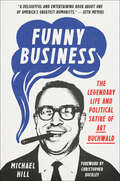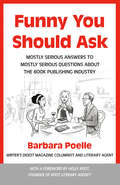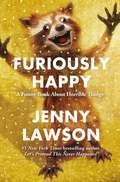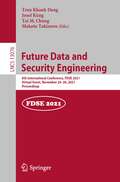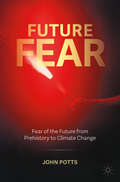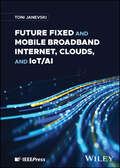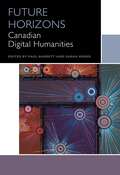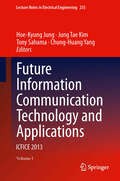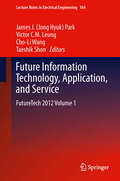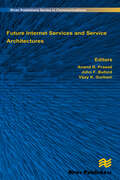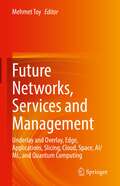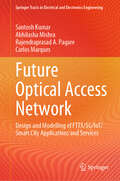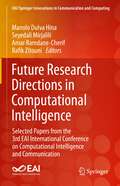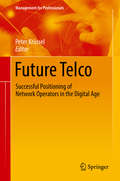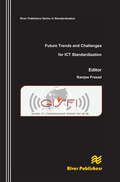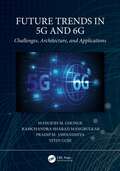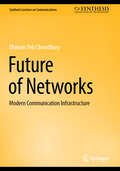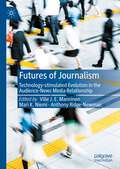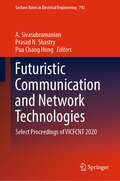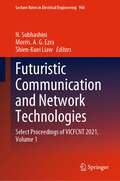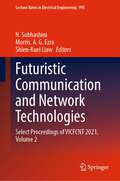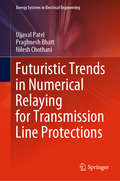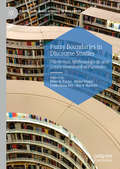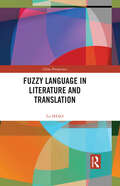- Table View
- List View
Funny Business: The Legendary Life and Political Satire of Art Buchwald
by Michael Hill&“A delightful and entertaining book about one of America&’s greatest humorists.&”—Seth Meyers This &“absorbing, illuminating&” (Jon Meacham) biography of the legendary political humorist reveals the life behind his must-read Washington Post columns, featuring never-before-published photos, documents, and interviews.Before Jon Stewart, Stephen Colbert, Trevor Noah, and Doonesbury, there was Art Buchwald. For more than fifty years, from 1949 to 2006, Art Buchwald&’s Pulitzer Prize–winning column of political satire and biting wit made him one of the most widely read American humorists and a popular player in the Washington world of Ethel and Ted Kennedy, Ben Bradlee, and Katharine Graham. Dean Acheson, former U.S. Secretary of State, called Buchwald the &“greatest satirist in the English language since Pope and Swift.&”Drawing on Buchwald&’s most memorable columns and unpublished correspondence with other famous people, Funny Business shows how Art Buchwald became an American original. Like Mark Twain, Dorothy Parker, and James Thurber, he satirized political scoundrels, lampooned the powerful, and &“worshipped the quicksand&” that ten presidents walked on, as Buchwald joked. &“The key to Buchwald&’s style of humor, he once stated, was to &“treat light subjects seriously and serious subjects lightly.&”But there was a darker, more serious side to Art Buchwald. A childhood spent in foster homes taught him to see comedy as a refuge. Buchwald also struggled with depression, a secret he kept from the public for nearly thirty years.This revealing book is studded with stories of Buchwald&’s friendships with Humphrey Bogart, John Steinbeck, Irwin Shaw, William Styron, Erma Bombeck, Frank Sinatra, Adam West ("Batman"), Robert Frost, and others. Throughout his career, Buchwald wrote about such historical events as the Vietnam War, the assassinations of John and Robert Kennedy, Watergate, and the 9/11 terrorist attack. Featured here are stories of Buchwald&’s nonstop one-liners, known in his day as &“Buchshots.&”Entertaining and absorbing, Funny Business looks back on Buchwald&’s brilliant gift for humor and satire, which will once again bring readers a comedic respite from troublesome times.
Funny You Should Ask: Mostly Serious Answers to Mostly Serious Questions About the Book Publishing Industry
by Barbara PoelleThere is a certain perception from the outside that the publishing industry is a near insurmountable fortress, with gatekeepers and naysayers manning the turrets looking for any way to fire a flaming arrow at the dreams of an aspiring writer. Funny You Should Ask, based on the popular Writer's Digest column of the same name, assists to deconstruct, inform, and illuminate the path to publication and beyond, all while dispelling the rumor that those in the industry are better than thou. And even though each writer's publishing journey is like a game of PLINKO--you can drop the chip in the same slot every time and get a different result--there are still common constructs and confusions that can be shared and explored together in order to help inform all writers. From understanding the nuts and bolts of a query letter, to learning how to process the soul-searing envy of watching someone else's career flourish, to how to talk to your editor, veteran literary agent Barbara Poelle covers the approach and execution of the common and uncommon bumps along the traditional publishing path. Includes • More than 100 questions answered including expanded answers to topics that didn't get the full treatment in a column • Writing exercises, submission checklists, and publishing BINGO for every publishing milestone
Furiously Happy: A Funny Book About Horrible Things
by Jenny LawsonIn Furiously Happy, #1 New York Times bestselling author Jenny Lawson explores her lifelong battle with mental illness. A hysterical, ridiculous book about crippling depression and anxiety? That sounds like a terrible idea.<P><P> But terrible ideas are what Jenny does best.<P> As Jenny says:<P> "Some people might think that being 'furiously happy' is just an excuse to be stupid and irresponsible and invite a herd of kangaroos over to your house without telling your husband first because you suspect he would say no since he's never particularly liked kangaroos. And that would be ridiculous because no one would invite a herd of kangaroos into their house. Two is the limit. I speak from personal experience. My husband says that none is the new limit. I say he should have been clearer about that before I rented all those kangaroos. <P> "Most of my favorite people are dangerously fucked-up but you'd never guess because we've learned to bare it so honestly that it becomes the new normal. Like John Hughes wrote in The Breakfast Club, 'We're all pretty bizarre. Some of us are just better at hiding it.' Except go back and cross out the word 'hiding.'"<P> Furiously Happy is about "taking those moments when things are fine and making them amazing, because those moments are what make us who we are, and they're the same moments we take into battle with us when our brains declare war on our very existence. It's the difference between "surviving life" and "living life". It's the difference between "taking a shower" and "teaching your monkey butler how to shampoo your hair." It's the difference between being "sane" and being "furiously happy."<P> Lawson is beloved around the world for her inimitable humor and honesty, and in Furiously Happy, she is at her snort-inducing funniest. This is a book about embracing everything that makes us who we are - the beautiful and the flawed - and then using it to find joy in fantastic and outrageous ways. Because as Jenny's mom says, "Maybe 'crazy' isn't so bad after all." Sometimes crazy is just right.
Future Data and Security Engineering: 8th International Conference, FDSE 2021, Virtual Event, November 24–26, 2021, Proceedings (Lecture Notes in Computer Science #13076)
by Josef Küng Tran Khanh Dang Makoto Takizawa Tai M. ChungThis book constitutes the proceedings of the 8th International Conference on Future Data and Security Engineering, FDSE 2021, which was supposed to be held in Ho Chi Minh City, Vietnam, in November 2021, but the conference was held virtually due to the COVID-19 pandemic. The 24 full papers presented together with 2 invited keynotes were carefully reviewed and selected from 168 submissions. The selected papers are organized into the following topical headings: Big Data Analytics and Distributed Systems; Advances in Machine Learning for Big Data Analytics; Industry 4.0 and Smart City: Data Analytics and Security; Blockchain and IoT Applications; Machine Learning and Artificial Intelligence for Security and Privacy; Emerging Data Management Systems and Applications.
Future Fear: Fear of the Future from Prehistory to Climate Change
by John PottsThis book places the contemporary fear of climate change in historical perspective, showing that throughout human history the dominant perspective on the future has been one of fear. Across a broad historical sweep, the book describes the varied means employed to predict and control the future: magic, religion, science, and technology. Future Fear traces fear of the future from prehistory to the present, culminating in the contemporary fear of imminent climate change catastrophe. Consideration is also given to hope in a more positive future, revealing that visions of the future have often been a mingling of fear and hope.
Future Fixed and Mobile Broadband Internet, Clouds, and IoT/AI
by Toni JanevskiFUTURE FIXED AND MOBILE BROADBAND INTERNET, CLOUDS, AND IoT/AI All-in-one resource on the development of Internet and telecoms worldwide, based on the technological frameworks as defined by the ITU Future Fixed and Mobile Broadband Internet, Clouds, and IoT/AI is a highly comprehensive resource that provides full coverage of existing and future fixed and mobile broadband networks, internet, and telecom and OTT services. This book explains how to perform technical, business, and regulatory analysis for future 5G-Advanced, 6G, WiFi, and optical access. This book also covers optical transport, submarine cable, future satellite broadband, cloud computing, massive and critical IoT and frameworks and use of AI / ML in telecommunications. Topics covered include: Internet technologies, IPv6, QUIC, DNS, IPX, QoS in Internet/IP, cybersecurity, future Internet 2030, Internet governance Future metallic and optical broadband, carrier-grade Ethernet, SD-WAN, OTN, submarine cable, satellite broadband, business and regulation of broadband Future mobile and wireless broadband, 5G-Advanced, 5G/6G spectrum management, 5G Non-Terrestrial Networks, QoS, 6G/IMT-2030, WiFi 7 (802.11.be), mobile business and regulatory aspects Cloud computing architectures and service models, MLaaS, BaaS, future OTT and telecom cloud services, business and regulation of clouds Future voice, future TV, XR/AR/VR, critical IoT/AI services, future OTT services, metaverse, network neutrality, future digital economy and markets Future Fixed and Mobile Broadband Internet, Clouds, and IoT/AI is an essential reference for government officials and regulators, business leaders, engineers, managers, and employees in the telecommunications industry, ICT business professionals, and students in telecommunications.
Future Horizons: Canadian Digital Humanities (Canadian Literature Collection)
by Susan Brown Gregory Betts Dean Irvine Sandra Djwa Constance Crompton Katherine McLeod Klara Du Plessis Kiera Obbard Roopika Risam Andrea Zeffiro Deanna Fong M Ryan Fitzpatrick M Eric Schmaltz Dani Spinosa M David Gaertner M Mark V. Campbell M Jon Saklofske Julia Polyck-O’Neill Kim Martin Rashmeet Kaur Pascale Dangoisse Michelle Schwartz Graham H. Jensen M Allan Cho Sarah Zhang Kendra Cowley Asen IvanovAu fil des vingt et quelques chapitres que compte cet ouvrage, les auteurs explorent le passé, le présent et l’avenir de la recherche, de l’enseignement et de l’expérimentation en sciences humaines numériques au Canada. Ce recueil, qui rassemble les travaux de chercheuses et de chercheurs établis et émergents, présente des initiatives contemporaines dans le domaine des sciences humaines numériques. Celles-ci sont conjuguées à un réexamen de l’héritage légué par ce domaine jusqu’à ce jour et à des discussions sur son potentiel. Future Horizons jette aussi un regard historique sur des projets numériques d’envergure, quoique largement méconnus, qui ont été réalisés au Canada. Future Horizons fait plonger le lecteur dans des projets qui mettent à contribution une vaste gamme d’approches — des jeux numériques aux laboratoires ouverts, des archives sonores à la poésie numérique, des arts visuels à l’analyse textuelle numérique — et qui puisent dans des matériaux canadiens tant historiques que contemporains. Dans leurs essais, les auteurs font voir comment une telle diversité d’approches remet en cause la connaissance en permettant aux chercheurs de poser de nouvelles questions.Ce recueil remet en question l’idée selon laquelle il n’existerait qu’une seule définition des sciences humaines numériques ou une seule identité collective nationale. En observant les interactions du numérique avec la race, l’autochtonie, le genre et la sexualité — sans oublier l’histoire, la poésie et le concept de nation —, Future Horizons propose une vue élargie du travail à l’intersection des sciences humaines numériques et des sciences humaines traditionnelles dans le Canada d’aujourd’hui. Ce livre est publié en anglais.Formats disponibles : couverture souple, PDF accessible et ePub accessible.
Future Information Communication Technology and Applications: ICFICE 2013
by Chung-Huang Yang Hoe-Kyung Jung Jung Tae Kim Tony SahamaThese proceedings are based on the 2013 International Conference on Future Information & Communication Engineering (ICFICE 2013), which will be held at Shenyang in China from June 24-26, 2013. The conference is open to all over the world, and participation from Asia-Pacific region is particularly encouraged. The focus of this conference is on all technical aspects of electronics, information, and communications ICFICE-13 will provide an opportunity for academic and industry professionals to discuss the latest issues and progress in the area of FICE. In addition, the conference will publish high quality papers which are closely related to the various theories and practical applications in FICE. Furthermore, we expect that the conference and its publications will be a trigger for further related research and technology improvements in this important subject.
Future Information Technology, Application, and Service
by Victor C.M. Leung Taeshik Shon James Jong Park Cho-Li WangThis book is proceedings of the 7th FTRA International Conference on Future Information Technology (FutureTech 2012). The topics of FutureTech 2012 cover the current hot topics satisfying the world-wide ever-changing needs. The FutureTech 2012 is intended to foster the dissemination of state-of-the-art research in all future IT areas, including their models, services, and novel applications associated with their utilization. The FutureTech 2012 will provide an opportunity for academic and industry professionals to discuss the latest issues and progress in this area. In addition, the conference will publish high quality papers which are closely related to the various theories, modeling, and practical applications in many types of future technology. The main scope of FutureTech 2012 is as follows. Hybrid Information Technology Cloud and Cluster Computing Ubiquitous Networks and Wireless Communications Multimedia Convergence Intelligent and Pervasive Applications Security and Trust Computing IT Management and Service Bioinformatics and Bio-Inspired Computing Database and Data Mining Knowledge System and Intelligent Agent Human-centric Computing and Social Networks The FutureTech is a major forum for scientists, engineers, and practitioners throughout the world to present the latest research, results, ideas, developments and applications in all areas of future technologies.
Future Intelligent Vehicular Technologies: First International Conference, Future 5V 2016, Porto, Portugal, September 15, 2016, Revised Selected Papers (Lecture Notes of the Institute for Computer Sciences, Social Informatics and Telecommunications Engineering #185)
by Muhammad Alam Joaquim FerreiraThis book constitutes the refereed proceedings of the First International Conference on Future Intelligent Vehicular Technologies, Future 5V 2016, held in Porto, Portugal, in September 2016. Future 5V presents vehicular networks and communications and also hosted the “Internet of Things (IoT) meets Big Data and Cloud Computing Workshop”. The 21 revised full papers presented were reviewed and selected from 38 submissions. The papers cover all aspects of intelligent vehicular communications including security and applications.
Future Internet Services and Service Architectures (River Publishers Series In Communications Ser.)
by Anand R. Prasad John F. Buford Vijay K. GurbaniFuture Internet Services and Service Architectures presents state-of-the-art results in services and service architectures based on designs for the future Internet and related emerging networks. The discussions include technology issues, key services, business models, and security. The work describes important trends and directions. Future Internet Services and Service Architectures is intended to provide readers with a comprehensive reference for the most current developments in the field. It offers broad coverage of important topics with twenty chapters covering both technology and applications written by international experts. The 20 chapters of Future Internet Services and Service Architectures are organized into the following five sections:-• Future Internet Services -- This section contains four chapters which present recent proposals for a new architecture for the Internet, with service delivery in the Future Internet as the key focus.• Peer-to-Peer Services -- Using the P2P network overlay as a service platform, five chapters explore the P2P architecture and its use for streaming services, communication services, and service discovery.• Virtualization -- Virtualization and its benefits for resource management, supporting hetereogeneity, and isolation are the basis for five chapters which describe virtualization at the endpoint, in the cloud, and in the network.• Event-Distribution -- Publish/Subscribe mechanisms are important for applications which require time-sensitive delivery of notifications. The two chapters in this section present recent developments in publish/subscribe load balancing and in sensor networks.• VANETs - Vehicular Ad Hoc Networks (VANETs) are a network technology which are designed for vehicle-to-vehicle and vehicle-to-infrastructure connectivity for moving vehicles. The four chapters in this section provide an introduction to VANETs, routing, services and system architecture.Future Internet Services and Service Architectures is complemented by a separate volume, Advances in Next Generation Services and Service Architectures, which covers emerging services and service architectures, IPTV, context awareness, and security.
Future Networks, Services and Management: Underlay and Overlay, Edge, Applications, Slicing, Cloud, Space, AI/ML, and Quantum Computing
by Mehmet ToyThis book describes the networks, applications, services of 2030 and beyond, their management. Novel end-to-end network and services architectures using cloud, wired, wireless, and space technologies to support future applications and services are presented. The book ties key concepts together such as cloud, space networking, network slicing, AI/ML, edge computing, burst switching, and optical computing in achieving end-to-end automated future services. Expected future applications, services, and network and data center architectures to support these applications and services in the year 2030 and beyond, along with security, routing, QoS, and management architecture and capabilities are described. The book is written by recognized global experts in the field from both industry and academia.
Future Optical Access Network: Design and Modelling of FTTX/5G/IoT/Smart City Applications and Services (Springer Tracts in Electrical and Electronics Engineering)
by Santosh Kumar Carlos Marques Abhilasha Mishra Rajendraprasad A. PagareThis book provides detailed information on a low-cost, high-speed infrastructure to support applications and services based on 5G/6G, the Internet of Things (IoT), smart cities, and fiber-to-the-x (FTTX). The contents will serve as a ready reference for researchers, design engineers, network operators, and service providers, as well as graduating engineers interested in pursuing careers in the optical access network domain. The book is a road map for designing and developing access networks for a variety of applications, including smart cities and long-distance high-speed access networks. The book is useful for undergraduate, postgraduate, and research students, particularly in developing South-East Asian countries.
Future Research Directions in Computational Intelligence: Selected Papers from the 3rd EAI International Conference on Computational Intelligence and Communication (EAI/Springer Innovations in Communication and Computing)
by Seyedali Mirjalili Rafik Zitouni Manolo Dulva Hina Amar Ramdane-CherifThis book presents select papers from 3rd EAI International Conference on Computational Intelligence and Communications (CICom 2022). The papers reveal recent advances in the broader domains of Computational Intelligence including (1) automation, control, and intelligent transportation system, (2) big data, internet of things, and smart cities, (3) wireless communication systems and cyber security and (4) human/brain-computer interfaces, and image and pattern recognition. The book demonstrates complex real-world problems in which mathematical or traditional modellings are not the preferred solution, hence alternative solutions are needed. This collection of applications demonstrates the important advances in computational intelligence. The book chapters’ present various ideas that will benefit researchers, graduate students and engineers in this domain.
Future Telco: Successful Positioning of Network Operators in the Digital Age (Management for Professionals)
by Peter KrüsselThis book examines the extensive changes in markets, technologies and value chains that telecommunication companies are currently confronted with. It analyzes the crossroads they have reached and the choices that now need to be made – to be a bit pipe or a trendsetter of digitalization. Based on an analysis of the key challenges for telcos, the book derives future market scenarios and puts forward recommendations for how they can successfully position themselves. It proposes a framework based on seven “levers,” which addresses concrete measures in each step of the value chain, ranging from technology, IT and processes, to innovation, marketing and sales issues. The book discusses the current challenges and provides both general recommendations and concrete solutions. Respected experts illustrate innovative strategic and technical trends and provide insights gained in real-life transformation projects. Recent developments in the areas of regulation, product development, competition between over-the-top (OTT) providers and telcos, as well as technical innovations like 5G, SDN/NFV, LEO satellites and MEC are discussed. Accordingly, practitioners, managers and researchers alike will benefit from the book’s wealth of examples and up-to-date insights.
Future Trends and Challenges for ICT Standardization
by Ramjee PrasadThis book comes in response to the Future Trends and Challenges for ICT Standardization. The technological areas covered are:• the need, importance and management of radio spectrum,• the development of future radio access technologies,• the convergence of telecommunications and broadcasting,• the possibilities and challenges brought by the Internet of Things (IoT),• the environment sustainability through the use of Green ICT,The book aims at identifying the importance of ICT standardization for strengthening the Indian industrial and business sector through Global ICT Standardization Forum for India (GISFI-www.gisfi.org). Further, it outlines the major challenges and trends in the ICT development worldwide, while mapping the Indian efforts on the background of the overall progress.The motivation behind this book is that a more informed context is made available to ensure sustainable scientific and economic growth.Finally, the book puts forward the best research roadmaps, strategies and challenges contributed by engineers from the industry, academia, and Government. It addresses the benefits to the entire society resulting from standardization.
Future Trends in 5G and 6G: Challenges, Architecture, and Applications
by Ramchandra Sharad Mangrulkar Mangesh Ghonge Pradip M Jawandhiya Nitin GojeFuture Trends in 5G and 6G: Challenges, Architecture, and Applications offers a comprehensive overview of basic communication and networking technologies. It focuses on emerging technologies, such as Software-Defined Network (SDN)-based ad hoc networks, 5G, Machine Learning, and Deep Learning solutions for communication and networking, Cloud Computing, etc. It also includes discussions on practical and innovative applications, including Network Security, Smart Cities, e-health, and Intelligent Systems. The book addresses several key issues in SDN energy-efficient systems, the Internet of Things, Big Data, Cloud Computing and Virtualization, Machine Learning, Deep Learning, Cryptography, and 6G wireless technology and its future. It provides students, researchers, and practicing engineers with an expert guide to the fundamental concepts, challenges, architecture, applications, and state-of-the-art developments in communication and networking.
Future of Networks: Modern Communication Infrastructure (Synthesis Lectures on Communications)
by Dhiman Deb ChowdhuryThis book provides a comprehensive discussion about the trends in network transformation towards intelligent networks and what the future holds for communication infrastructure. The author unveils the interplay of technologies and technological know-how that are shaping the industry. Delving into the evolution of networking infrastructures from static to dynamic and intelligent, this book explores how these advancements are enhancing user experiences, driving digital transformation in businesses, and revolutionizing the way the world connects. Covering trends in networking technologies, advances in SOCs, cloud networking, automation, network insights (telemetry and observability), container networking, network security, and AI infrastructure, readers will gain valuable insights into the cutting-edge technologies shaping the landscape of communication infrastructure. Whether you're a seasoned industry professional or a newcomer to the field, this book offers an invaluable resource for understanding the latest advancements and future directions in networking technology.
Futures of Journalism: Technology-stimulated Evolution in the Audience-News Media Relationship
by Anthony Ridge-Newman Ville J. E. Manninen Mari K. NiemiThis book examines how technologies are changing, will change, or could change the relationship between audiences and news media. It highlights how novel technologies could have fundamental implications for the way that news media interact with wider society. The book comprises of four thematic parts. Firstly, it focuses on the impact of technological development on the news media business, exploring how news media uses new technologies to improve their sustainability. Secondly, it considers the ethical dilemmas that arise when audience-news media relationships are transformed by technological development. The third part of the book approaches the effects of novel technologies from the journalists’ viewpoint: how do new technologies intervene in the audience-news media relationship through journalistic work? Finally, the fourth part dissects the ways new technologies can impact audience-news media relationships through transforming audience agency, audience preferences and news media’s understanding of them.
Futuristic Communication and Network Technologies: Select Proceedings of VICFCNT 2020 (Lecture Notes in Electrical Engineering #792)
by A. Sivasubramanian Prasad N. Shastry Pua Chang HongThis book presents select proceedings of the International Conference on Futuristic Communication and Network Technologies (CFCNT 2020) conducted at Vellore Institute of Technology, Chennai. It covers various domains in communication engineering and networking technologies. This volume comprises of recent research in areas like optical communication, optical networks, optics and optical computing, emerging trends in photonics, MEMS and sensors, active and passive RF components and devices, antenna systems and applications, RF devices and antennas for microwave emerging technologies, wireless communication for future networks, signal and image processing, machine learning/AI for networks, internet of intelligent things, network security and blockchain technologies. This book will be useful for researchers, professionals, and engineers working in the core areas of electronics and communication.
Futuristic Communication and Network Technologies: Select Proceedings of VICFCNT 2021, Volume 1 (Lecture Notes in Electrical Engineering #966)
by Shien-Kuei Liaw N. Subhashini Morris. A. G. EzraThis book presents select proceedings of the Virtual International Conference on Futuristic Communication and Network Technologies (VICFCNT 2021). It covers various domains in communication engineering and networking technologies. This volume comprises recent research in areas like cyber-physical systems, acoustics, speech & video signal processing, and IoT. This book is a collated work of academicians, researchers, and industry personnel from the international arena. This book will be useful for researchers, professionals, and engineers working in the core areas of electronics and communication.
Futuristic Communication and Network Technologies: Select Proceedings of VICFCNT 2021, Volume 2 (Lecture Notes in Electrical Engineering #995)
by Shien-Kuei Liaw N. Subhashini Morris. A. G. EzraThis book presents select proceedings of the Virtual International Conference on Futuristic Communication and Network Technologies (VICFCNT 2021). It covers various domains in communication engineering and networking technologies. This volume comprises recent research in areas like cyber-physical systems, acoustics, speech & video signal Processing, and the Internet of Things. This book is a collated work of academicians, researchers, and industry personnel from the international arena. This book will be useful for researchers, professionals, and engineers working in the core areas of electronics and communication.
Futuristic Trends in Numerical Relaying for Transmission Line Protections (Energy Systems in Electrical Engineering)
by Nilesh Chothani Ujjaval Patel Praghnesh BhattThis book presents the state-of-the-art approach for transmission line protection schemes for smart power grid. It provides a comprehensive solution for real-time development of numerical relaying schemes for future power grids which can minimize cascade tripping and widespread blackout problems prevailing all around the world. The book also includes the traditional approach for transmission line protection along with issues and challenges in protection philosophy. It highlights the issues for sheltering power grid from unwanted hazards with very fundamental approach. The book follows a step-by-step approach for resolving critical issues like high impedance faults, power swing detection and auto-reclosing schemes with adaptive protection process. The book also covers the topic of hardware solution for real-time implementation of auto-reclosing scheme for transmission line protection schemes along with comparative analysis with the recently developed analytical approach such as Artificial Neural Network (ANN), Support Vector Machine (SVM) and other machine learning algorithms. It will be useful to researchers and industry professionals and students in the fields of power system protection.
Fuzzy Boundaries in Discourse Studies: Theoretical, Methodological, and Lexico-Grammatical Fuzziness (Postdisciplinary Studies in Discourse)
by Péter B. Furkó Ildikó Vaskó Csilla Ilona Dér Dorte MadsenThis book focuses on the multifarious aspects of ‘fuzzy boundaries’ in the field of discourse studies, a field that is marked by complex boundary work and a great degree of fuzziness regarding theoretical frameworks, methodologies, and the use of linguistic categories. Discourse studies is characterised by a variety of theoretical frameworks and disciplinary fields, research methodologies, and lexico-grammatical categories. The contributions in this book explore some of the nuances and implications of the fuzzy boundaries in these areas, resulting in a wide-reaching volume which will be of interest to students and scholars of discourse studies in fields including sociology, linguistics, international relations, philosophy, literary criticism and anthropology.
Fuzzy Language in Literature and Translation (China Perspectives)
by Lu SHAOBringing a fuzzy logic-based approach into translation studies and drawing on the theory of information entropy, this book discusses the translation of fuzzy language in literary works and advances a new method of measuring text fuzziness between translation and source text. Based on illustrative examples from the popular novel The Da Vinci Code and its two translated Chinese versions, the study demonstrates the fuzziness measuring method through an algorithmic process. More specifically, information entropy is applied to measure the uncertainty associated with readers’ understanding of the original and its corresponding target texts. The underlying hypothesis is that the probability distribution in which readers will understand identified fuzzy discourse is measurable. By further explicating the validity of the hypothesis, it seeks to solve translational “fuzzy” problems in the translation process and offers an alternative, novel approach to the study of “fuzzy” literary texts and their translation. Hopefully, the argument of the book that the intrinsic uncertainty of fuzzy language can be evaluated through Shannon’s information entropy will open up a new avenue to the quantitative description of the fuzziness of language and translation. This book will be of interest to scholars and students in translation studies, applied linguistics, and literary criticism.
